Lithuania ’21: “No doubt”
The scene: 2021 World Cup, group of death, round 2: Argentina vs. Serbia, 7:21 into the first half
The incident: Serbia goalkeeper Miodrag Aksentijevic passes the ball long up the right side of the pitch. Milos Stojkovic slides to receive the ball. Argentina goalkeeper Nico Sarmiento slides from the other direction to clear the ball. There is a collision.
The decision: Second referee Tomohiro Kozaki almost immediately shows Stojkovic the red card for serious foul play.
Video support review result: It’s clear that Stojkovic unnecessarily raised his boot in the direction of Sarmiento’s face and kicked it. Nurdin Bukuev, referee of the match and a seasoned veteran in his fourth World Cup, echoes the judgment of his colleague and says, “No doubt.” The challenge by Serbia is rejected and Kozaki’s call is vindicated. His decision was key in setting the standard in terms of criteria for determining serious foul play decisions throughout Lithuania ‘21.
Video Support Is a Win-win
Has there ever been a World Cup that was so scrutinized for its officiating? The use of video support at this competition gave players, coaches and everybody else the desire to second-guess any and all referee decisions. Kozaki recalls, “The teams were confused at the beginning about when to request video support: for example, a totally unnecessary claim about a DOGSO (denying an obvious goal-scoring opportunity) even though the defending goalkeeper was clearly guarding his goal. But by the knockout round, teams had a very good sense of when to request video support.”
The concept of video support (VS) had at first seemed odd to Kozaki. “Unlike VAR, in which there is another official giving feedback, video support simply involves the same referees reviewing a call they just made. Though I wondered about the validity at first, the system was ultimately successful in that it both confirmed calls and overturned them when necessary. I think it’s a great system. FIFA continues to be active in introducing technology to football, and I think it is welcome that this trend has come to futsal as well. I also feel that it was correct for futsal to adopt VS instead of VAR because the more speedy and economical VS is a better fit for futsal.”
The red card is produced without hesitation for Stojkovic’s challenge (Photo credit: Blazetrends.com)
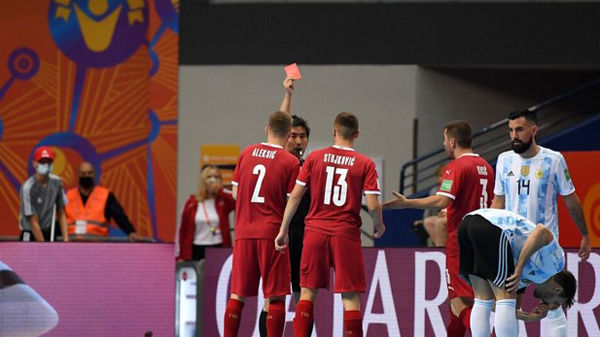
Finding Futsal Accidentally
The 43-year-old Osaka native found futsal a little over two decades ago – or maybe it was a case of futsal finding him. In his words, he had “peaked out as a football player when in elementary school” (on the same team and a grade above legendary footballer Junichi Inamoto), but was interested enough in refereeing to get his badge when in high school. In 1997, while still in college, he worked part-time at a futsal pitch rental business, now the training facility of F.League mainstay Shriker Osaka.
“During the New Year’s holiday, the facility would be used for a tournament by all of the top players and teams at the time: Shuji Kai, Yoshi Maeda, Kiyoshi Sagane – Japan’s first wave of serious futsal players. I would officiate because I worked there and it was difficult to find referees. After a couple of years, Kai told me that I was one of the best referees he had ever worked with and a local FA official urged me to work at the regional qualifiers for the U-12 national championship.”
Discovering the Excitement of Officiating
Japan did not even issue Futsal-only Class 1 or 2 badges when Kozaki was earning his stripes at a variety of official competitions in the Kansai area. One breakthrough experience for him was Liga Tenryu, a competition in the early 2000s participated in by many Brazilians who were in Japan on working visas. “I found it to be intense enough to make me get serious about refereeing.” And the other breakthrough experience was a number of national competitions held by the Japan Football Association (JFA) in the Kansai area. “It's not possible now, but I was given the opportunity to attend the tournaments despite being only a Futsal Class 3 referee. It was around this time that I met AFC/FIFA futsal referee instructor, Yasuhiro “Zak“ Matsuzaki (a member of FIFA’s futsal expert panel). I was really lucky.” The hotter the action, the more rewarding Kozaki found his work.
The JFA established an apparatus for issuing futsal-only certification just as Kozaki became experienced enough to work in Japan’s top flight. Once he earned his Class 1 badge, he would debut in the second year of Japan’s F.League (2008) and over the course of the ensuing decade win Best Referee of the Season honors no less than five times. But he’s quick to point out that, “I’ve only really mastered the job during the past five or six years.”
A Collective Art
So you don’t give yourself credit for the first seven or eight years of your career? “I realized that my approach was incomplete. I had been working under the mistaken impression that a referee need only enforce the Laws of the Game with accuracy. I had not yet known what I now know: that the referee creates the game along with the players, team officials, LOC staff, spectators, and everyone else involved. This means refereeing with nuance: Is the whistle or card even necessary for the match; a long whistle versus a short whistle; whether to blow the whistle right away or pause to wait and see what happens; when there is a clash between players, do I first approach the player who committed the foul, the player who was fouled, or both, etc. I started to better read the game by developing a pair of eyes outside of myself and considering what would most benefit the match. That enabled me to determine what kind of officiating best serves the players and the game.”
“In the first years of the F.League there was many a time when I would be holding back tears on the ride home in the bullet train (laughs). Games would get out of hand and I would get an earful of negative feedback from players, teams and my senior referee colleagues. I since learned how to use my personality to provide a relaxed style to the game but also to step in and intervene when necessary. I listen to what players have to say but not so much that it interferes with the game, and I do not hesitate to come down hard on players who cross a certain line.”
Kozaki has won the F.League Best Referee Award a total of five times, an all-time record (Photo credit: F.League)
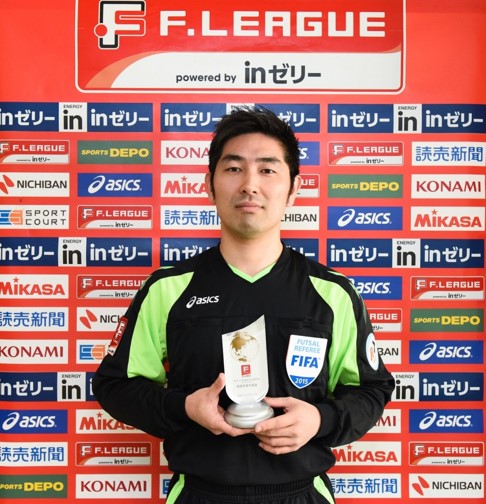
The Joy of Internationals
Kozaki’s first World Cup was Colombia 2016, but his international debut was five years prior, in 2011. “It was a five-nation tournament in Hangzhou, China. I think that I did as well as my colleagues, but what I really liked about that tournament was the way the players and teams were so friendly to each other after the whistle. In Japan, everything is always done politely, so the players line up after the game and bow, but there is still some tension in the air. The feeling was so much more friendly in Hangzhou that I thought international matches are really a lot of fun!”
“My debut at a full AFC competition was in 2013, but it wasn’t until the 2015 AFC Club Futsal Championship that I really felt recognized as a top Asian referee. I was the second referee in the final between Tasisat (Iran) and Al-Qadsia (Kuwait). It was a full house in Isfahan, Iran. All males (laughs). The match was as fiercely contested as you would expect from a final in an international competition, but I felt that the players had faith in me because I showed them the respect they deserved, and the game never got out of control. Applying a soft touch in my game control and taking the time to communicate with the players and keep them calm, I made sure to wear a smile and establish rapport.”
Kozaki officiated at the ’16 AFC Championship final match in Uzbekistan (Photo credit: Tomohiro Kozaki)
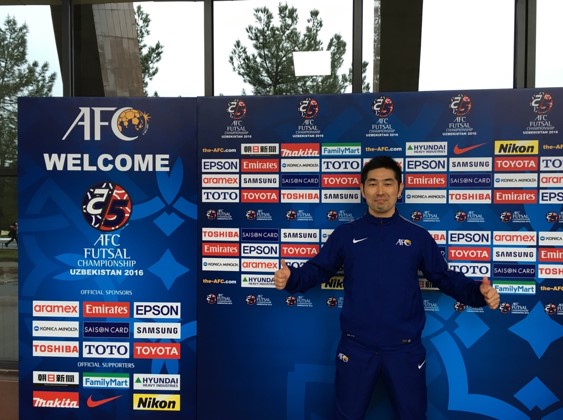
First World Cup
Had you set your sights on Colombia ’16 as your World Cup debut? “It’s not something you shoot for! You either get chosen or you don’t. My job was to focus on my work at AFC tournaments, and I know nothing about the process of how the AFC nominates referees for World Cup duty. I recall being contacted in May of 2016 about my assignment to the Colombia World Cup. Since I would be the only individual representing Japan, I felt a strong sense of responsibility. Looking back, the whole thing finished in a flash.”
Nerves got the better of you? “Once games started, my performance was no different from usual. In fact, I still feel that I did a good job as the second referee in the third-place playoff between Iran and Portugal. But there was so much pressure in the air that I did not really have the emotional latitude to take in the experience. Still, it did give me the opportunity to see how the best referees perform at that level: the air of authority they create. The desire to reach that level was the aspiration that I brought back with me from that competition.”
Kozaki also officiated at the third-place match in Colombia ‘16 (Photo credit: Kenji Zama)
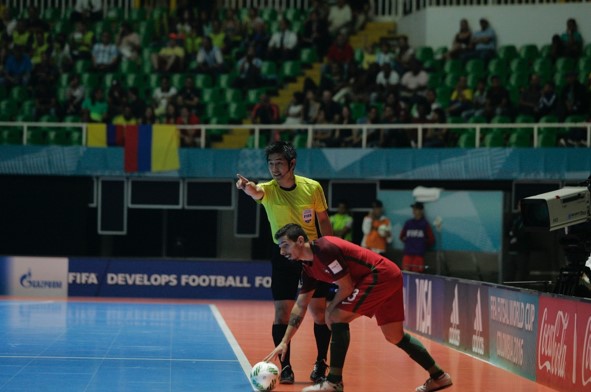
The Higuita/Guitta Effect
So how was it different in 2021? You officiated at several big games. How was your World Cup this time? “A lot more fun. Lithuania is a very beautiful and prosperous country, and with the support of FIFA and the LOC, we were able to focus on our refereeing activities with peace of mind. That’s why I really enjoyed the Argentina-Serbia match. And I would also single out the Venezuela-Costa Rica and Spain-Czech Republic games as well. I had the good fortune of refereeing in multiple games that were quite intense. And the Portugal-Spain match - I don’t think I have ever sweat that hard when serving as timekeeper (laughs)!”
As third referee at the Brazil-Argentina and Brazil-Kazakhstan games, I was covered with sweat by halftime! Since the third referee and the reserve assistant referee are each assigned to one of the benches, the job involves not only bench control but also moving into position in order to be even with the goal when the goalkeeper has advanced up the pitch. Since I was in charge of the Brazil bench, whenever Guitta advanced forward, I had to move into position so that I could determine whether a shot against Brazil entered the Brazil goal. In the bronze match, it was Higuita against Guitta, so you can imagine how many times I, as the third referee, and the reserve assistant referee had to go back and forth to the goals!”
With the AFC futsal referees selected for duty at Lithuania ‘21 (Photo credit: Tomohiro Kozaki)
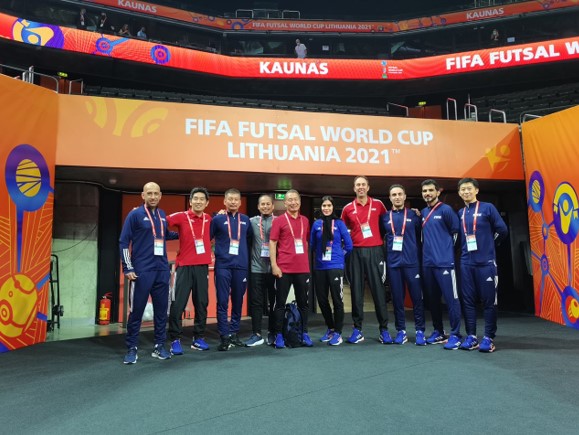
Asia’s Great Leap Forward
You are still officiating at F.League matches. Why did you decide to end your career as a FIFA referee? “It was the decision of the JFA because they wanted to bring up the younger referees. I have had a great experience in the international stage with a lot of support from the JFA. I'll talk to my family about whether to continue working as a referee, but whatever my role, I'll continue to be involved in futsal. I would like to express my gratitude for the support I have received so far by sharing with younger referees the benefit of my experience.”
"When I informed my colleagues at the World Cup that it would be my last international competition, they all urged me to stay on as a referee instructor, which I will of course do if called on to do so. But in that case, I will be a newcomer! I will study from scratch again and build up a new career. It’s a new challenge.”
Any parting words or thoughts? “I would say that this World Cup was, in fact, Asia’s great leap forward: all five teams made it into the round of 16, I was the third referee at the bronze match, and the final had Nurdin Bukuev of Kyrgyzstan as the referee and Gelareh Nazemi of Iran as the timekeeper. I’m a proud product of the AFC and its instructors and referees. They are the ones who have made my refereeing journey so enjoyable and given me so many valuable experiences, so I am extremely grateful.”
A brilliant international and local refereeing career for Kozaki! (Photo credit: Tomohiro Kozaki)
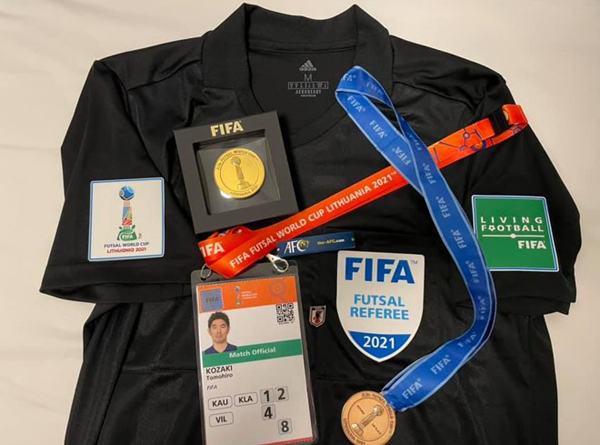
Posted by Luca Ranocchiari --> luca.ranocchiari@futsalplanet.com